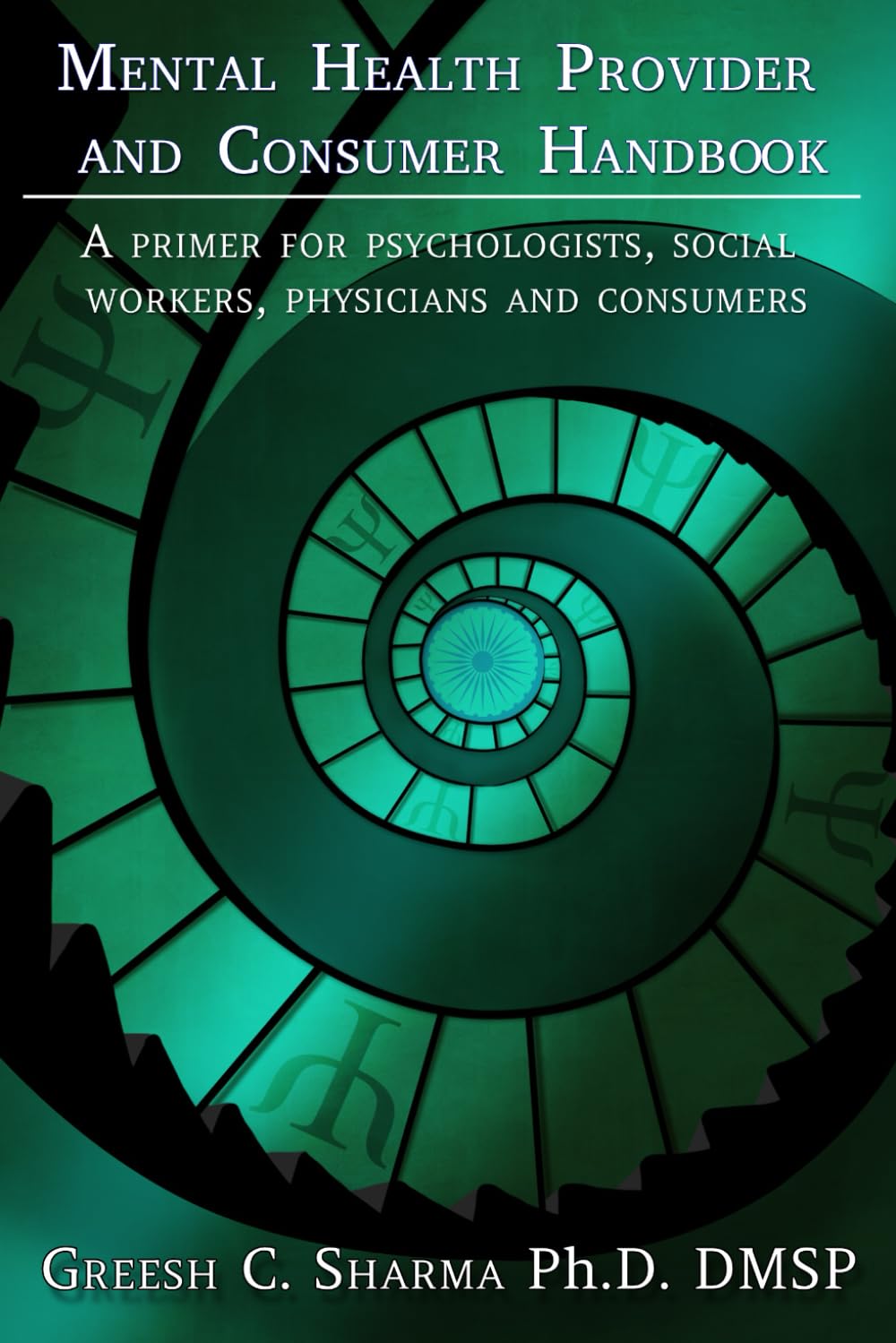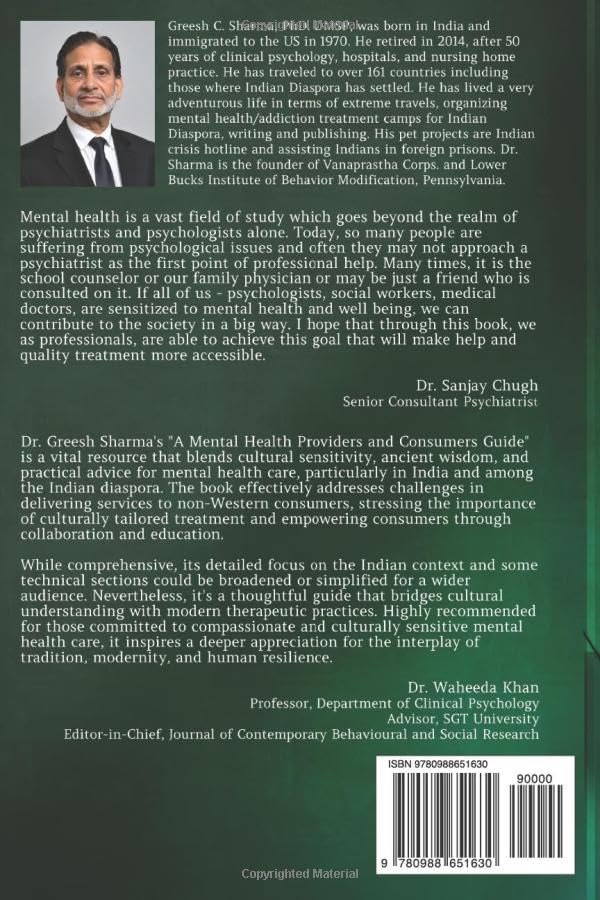Mental Health Matters!
Mental Health Provider and Consumer Handbook
This book serves as an essential guide for both consumers and aspiring practitioners, providing the tools needed to navigate the complex mental health landscape and distinguish between common, culturally-bound struggles and diagnosable conditions requiring professional help. It empowers readers to find clarity in chaos, understand the line between normal reactions and clinical realities, and make informed, compassionate decisions for themselves and those they care about.
This book also aims to assist mental health providers and consumers in recognizing the importance of establishing a clear contract for effective teamwork. It emphasizes the necessity of open communication and operating within the principles of democracy and spirituality. Spirituality, in this context, embodies unconditional empathy with a sense of 'oneness'.
Integrating the holistic, culturally rooted, unexplored frameworks of psychology procedures with modern mental health interventions offers innovative possibilities for addressing a broader range of pathologies and dysfunctional behaviors, making them accessible and acceptable for a wider population.
The opportunity!
Psychotherapy is an opportunity to empower both the consumer and the provider
Life is an opportunity to ensure one's psycho-somatic well-being, socio-economic success and personal-spiritual evolution. It is essential to initiate the journey by seeking clarity as to one's perceptions of the self, the others, and the world. Psychotherapy process, essentially, is the first-step empowering both the consumer and the provider to maximize this opportunity.
Why Choose the Kindle Edition?
- Instant access on any device - read on your phone, tablet, or Kindle
- Portable and lightweight - carry your entire library wherever you go
- Adjustable text size and font for comfortable reading
- Search functionality to quickly find specific topics
- Highlight and take notes directly in the book
- Sync across all your devices automatically
- Environmentally friendly - no paper, no shipping
- Available on January 15th, 2026 - pre-order now!
Quick Glance!
Table of contents
Take a quick glance at all of the content covered in the book.
Foreword
i
About the Author
iii
Preface
vii
Acknowledgments
x
Normal vs Mental Disorders ▲
1
Compulsive Distraction
2
Perceived Incompetence
3
The Illusion of Intimacy
4
Trends in Depressive Disorder Prevalence
5
The Defining Question for Our Time
6
Psychology of East and West ▲
8
Background/ Vignettes
8
Mental Health Mainstreaming
15
Metal Illness stigma eradication Strategies
18
Making of the Mental Health Practitioner ▼
22
Basics of Treatment and Care ▼
47
Empowering the Mental Health Consumer ▼
58
Exploring the Indian Psychology ▼
100
Conclusion
112
What experts said
★★★★★
I believe that psychotherapy should be practiced by qualified professionals in a time-honored way. The standards promulgated around the world ought to be ethnically and culturally congruent. Greesh has studied those factors and the differences between what is practiced here in the USA, and what can be or should be modified in the regional contexts. For example, India faces a major mental health problem and probably records the highest suicide rate in the world according to some studies, even though politicians and patriots (!) try to deny it. Denial has been the age-old defense mechanism universally, to the detriment of the societies. It is time that we de-stigmatize mental illness, prevent it, and treat it thoroughly, and as vigorously as we treat the physical illnesses.
★★★★★
A Mental Health Providers and Consumers Guide by Dr. Greesh Sharma is a thoughtful and comprehensive resource that bridges cultural wisdom and modern therapeutic practices. It is a must-read for those committed to advancing mental health care in culturally diverse settings. It equips practitioners with practical tools while inspiring a deeper appreciation for the interconnectedness of tradition, modernity, and human resilience. Whether you are a practitioner seeking practical tools or a consumer looking for clarity, this book is a valuable guide that will inspire and motivate you in your mental health journey.
Excerpts from the Book
-
For Providers
As much as mental health professionals aim to box individuals in terms of personalities, diagnosis and dynamics; in reality, it is practically impossible to peg individuals into neat clinical entities. After all, individuals are not just all “conscious” beings, but also a part of a composite of “unconscious” layers of cognitions, emotions, experiences and memories. It takes time, skills and effort to sort through their distinct, complex personalities. (page 9)
The supply-demand gap in the mental health professionals presents an urgent opportunity for providers to engage in patient and consumer advocacy. Enabling the public to become informed consumers of available mental health choices, is a necessary strategy for mental health providers. It helps providers improve their visibility, convey their relevance and promote public trust. (page 23)
PROACTIVE OUTREACH
Successful marketing to local hospitals, nursing homes, and schools can be fertile ground for soliciting referrals. Like general physicians, setting up a private office/clinic is a common goal. A positive encounter between a non-psychiatrist mental health provider and the public can have multiple benefits. (page 28)THE PITFALLS OF OVER-MEDICALIZATION
One of the most concerning trends in contemporary mental health practice is the over-reliance on psychotropic medication as the primary, and often sole, mode of intervention. Far too often, patients are prescribed medications hastily, without a thorough exploration of the underlying causes or medical etiology, life circumstances, and emotional realities that contribute to their distress. (page 63) -
For Consumers
Consumers can reasonably expect mental health providers to begin addressing their distress effectively from the first visit. The provider must provide adequate information about their rights, their responsibilities, fees/costs, scheduling, tentative diagnosis, anticipated duration of treatment, possible referrals, need for medication, how to handle emergencies, medication side effects, etc.
Consumer also needs to know the consequences of not showing up for their appointment or being late or failing to cancel appointments. Promoting compliance and responsibility for keeping appointments i.e. managing time and responsibilities should be considered as part of the treatment. (page 19)




